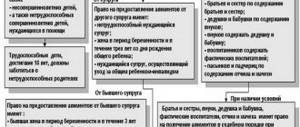Can the court refuse alimony?
Decisions are made in favor of the defendant in cases where the plaintiff abuses the right by presenting demands that are obviously contrary to the law.
The law also provides for circumstances in which the payment of maintenance funds is terminated. After this point, collection of funds is unreasonable.
Refusal can occur both on the part of the alimony payer and the recipient - the person with whom the child remains to live. The most common situations:
- Reluctance to do business with the other party for emotional reasons. In this case, usually the mother completely breaks off relations with the father, does not want to answer his phone calls, meet, negotiate, participate together in court hearings, etc. At the same time, she has sufficient material resources to support the child and comfortable conditions for his living and upbringing. Or her goals include depriving the father of parental rights in connection with the commission of acts of violence against her or a minor.
- Refusal is advocated by a payer who evades paying arrears of alimony or wants to go abroad, or otherwise hides other significant circumstances that may cause deprivation of his status as a parent.
- This measure may be taken in cases where the parties have offset claims for alimony payments against other obligations. For example, the mother and father agreed on the transfer of an apartment to pay off funds upon reaching 18 years of age. Calculations were carried out taking into account indexation. So payments are fully counted subject to the donation of the apartment. The second party, with whom the child permanently resides, agrees to terminate monetary payments in this way. Parents can also agree on a one-time transfer of one large amount to cover obligations until the age of 18. There is a refusal to receive alimony in accordance with Article 104 of the RF IC.
When is the reason for refusal legitimate?
The plaintiff’s right to alimony is lost (under Article 120 of the RF IC) if the circumstances presented to the court by the potential alimony payer-defendant are as follows :
- the child has become an adult, he is not studying, he is not disabled;
- a child who has reached 18 years of age has been removed from disability, has an ITU conclusion and is recognized as fully able to work;
- a minor teenager after 16 years of age was officially emancipated through the court.
In the latter case, this can happen if the teenager officially got a job, got married and started a family, or opened his own business (Article 28 of the Civil Code of the Russian Federation). Also, the death of the payer himself or the one for whom these payments were assigned automatically terminates alimony payments.
If the mother of a child for whom alimony was assigned dies, the obligation of the alimony payer still remains, and court-appointed guardians will represent the interests of the children.
The refusal will be valid if the parents divorced and the child, with the consent of the biological father, was adopted by another man. In this case, all responsibilities for maintaining the child pass to the adoptive parent.
Procedure for preparing documents for refusal
To make a refusal legal, it must be properly formalized from a legal point of view. There are several options for the procedure:
- until the court makes a decision to collect alimony;
- when conducting enforcement proceedings;
- by concluding a settlement agreement at any stage of the process.
In the first case, the parties independently determine the conditions for refusing payments. In this case, it is not necessary to go to court. The main thing is to protect the interests of the child so that there are no claims from the guardianship and trusteeship authorities.
The absence of payments in this case is of a formal nature and may be contrary to the law, even if there is an agreement between the parties. For example, a child remains to live with his mother, who has a high income from business activities. The ex-husband is temporarily unemployed, and she refuses to receive payments. However, the lack of regular income is not a reason why a person may be exempt from responsibility for the maintenance of his children. In this regard, if a woman’s financial conditions become more complicated, she may demand repayment of alimony arrears for the past period and collection of monthly payments. If she goes to court, her demands will be satisfied.
After filing a claim and opening a child support case, parents can reach an agreement, abandon disputes and independently resolve the procedure for transferring funds to a minor. A unanimous decision is reflected in a settlement agreement drawn up by the participants in the process. The document is checked for compliance with the law and approved by the court. An agreement made in violation of the rights of children or parties to the process will not be accepted by the court.
Refusal to pay can also occur through an appeal against a judicial act in a procedural manner (Article 326.1 of the Code of Civil Procedure of the Russian Federation). The decision has no legal force and is therefore free from execution.
The transfer of alimony can also be stopped at the stage of enforcement proceedings. Based on Article 440 of the Code of Civil Procedure of the Russian Federation, the application is sent to the judicial authority that made the decision and issued a sheet for the implementation of the law enforcement act. A copy of it is sent to the bailiff conducting the proceedings. Exemption from payment occurs only by a new court act.
It is possible to stop paying alimony, that is, to refuse on the terms established by a notarial agreement of the parties, upon the application of the interested party in court (Article 101 of the RF IC). It is also possible to be released from obligations by mutual agreement of the parties. For this purpose, a document terminating the contract is signed. Refusal of alimony is made in the same form as the conclusion of the main document. If it was signed in simple written form, then an ordinary agreement is sufficient. When the contract has been certified by a notary, changes or releases from obligations are also made in the notary’s office.
Unilateral refusal of alimony is prohibited by law, except for its issuance in court.
If the rights to alimony are lost by law
You should not go to court with a claim for the collection of alimony when situations arise in which the alimony payer is legally released from obligations in relation to children. So the claim will be denied if:
- the man is not the father of the child and he has a DNA test result;
- father and child are blood relatives, but there is a dash on the birth certificate;
- the mother demands child support without having proof of paternity. The court will require her to conduct a genetic examination of the alleged male father;
- there is an agreement according to which the mother and father agreed that alimony will be in a fixed sum of money or that real estate has already been registered on the child, covering the entire amount of alimony for the remaining years of payments until the age of 18 (Article 104 of the RF IC).
Also, the alimony recipient (mother) cannot even demand a monetary subsidy through the court if the child moved to live with the alimony-paying father and he assumed all obligations for his maintenance. On the contrary, a man can now demand child support from a woman and the court will most likely satisfy his demand.
If the parents began to live together again, then the mother may not withdraw her claim to collect alimony from the man; this is permitted by law. But the child’s father can challenge this decision by presenting to the court evidence that the child actually lives with him and he supports him.
In what cases will the court refuse alimony?
The initiators of the abolition of alimony payments are mainly the guardianship and trusteeship authorities. This happens when a child remains in the care of the state in educational institutions: orphanages, boarding schools, etc. The consent of the parents in this case is not requested.
Citizens have the right to go to court on grounds for termination of enforcement proceedings.
Sample application.
In practice, there are common cases when the court refused to reduce alimony:
- The child has not reached 18 years of age, but is recognized as legally competent due to emancipation: opening his own business, getting married at the age of 16 years. From this moment on, the person is deprived of the right to receive funds.
- Parents are deprived of the right to raise a minor adopted by another person. They are not related by blood, but the very fact of recognizing the children as their own places the responsibility for their upbringing on the new guardians. When a citizen with whom he has a biological connection, but who has lost the status of a parent, makes demands for child support, the court refuses.
- The court will refuse alimony when the child is not a joint child and the man has doubts about his relationship with him. In this case, the mother files a claim for maintenance obligations.
- The putative father has the right to request an independent examination to establish a genetic connection. If the mother's demands are not met, payment of funds will be refused.
Refusal of alimony at the initiative of the payer
In addition, the payer can file a claim in court to cancel alimony due to a worsened financial situation (Article 119 of the RF IC).
For example, a man has a low salary. After transferring alimony, the amount left on hand is less than the established minimum subsistence level. In addition, a new wife with a child and elderly parents are dependent on him. The judge may take into account the financial circumstances of the payer and exempt him from paying money to his ex-wife. At the same time, the high income of the ex-wife, the receipt of an inheritance by the child and other circumstances cannot serve as a basis for refusing alimony. This is due to the fact that the money is paid for the child, and not for the spouse, and by law, parents are required to take an equal part in the maintenance of their children. Expert commentary
Shadrin Alexey
Lawyer
Cancellation of alimony at the request of the payer is the right of the court, not an obligation. Therefore, much depends on the circumstances of a particular case, the evidence base and the personal position of the judge on this issue. In judicial practice, payments are usually not canceled completely, but reduced.
When should the court refuse child support?
Article 92 of the RF IC provides for cases when a court decision is made to exempt from payment of funds for the maintenance of the other spouse. Any of the above requirements may be considered illegal:
- If a citizen’s disability is caused by his unlawful behavior, for example, due to addiction to alcohol or drugs.
- When citizens have been married for a short period. In each case, the period is determined individually. In practice, it usually ranges from 1 to 5 years.
- If the spouse behaves inappropriately in the family, the court is forced to refuse payments. Such circumstances include cases where a citizen did not participate in raising children, spent family money on entertainment, did not have a permanent job and did not want to look for one.
What is needed to register for re-applying to court?
If the judicial authority refuses to pay alimony, upon repeated application the list of required documents remains the same. Proof of relationship and marriage of the spouses will be required. The court must be provided with a statement of claim and documents proving the need for maintenance.
To obtain alimony, you can use different methods. One of them is drawing up an agreement. Former spouses need to agree on the amount, procedure, conditions of security, and then document everything.
If you cannot draw up an agreement, you will have to resolve the issue in court. To do this, you must provide all the necessary documents. After consideration, a decision is made. Then the documentation goes to the executive bodies. Usually the decision is made in favor of the children, since this is a guarantee of their rights.
What you can do right now:
- Watch the video in this article and find out basic information on collecting alimony from a justice worker
- Remember that you can always re-file a claim with the court to review the decision to cancel the collection of alimony
- The key to success in a lawsuit is correctly executed documents with the necessary evidence
Cases when the court refused to reduce alimony
A parent paying child support can file a claim to reduce the amount of money paid. In some cases, the courts cooperate and make rulings to reduce the amounts. In other situations, easing the financial burden is unacceptable and a refusal follows. Such circumstances include:
- receipt by minors as a gift or inheritance of valuable property, for example, an apartment or a car;
- state support for the child - assignment of social benefits, pensions, disability benefits;
- employment, if income is small and does not exceed the amount of alimony;
- a woman’s return to work after maternity leave, her high earnings, etc.





